« March 2008 | HOME PAGE | May 2008 »
April 23, 2008
Bear-Baiting China

There's an interesting column about the competing anti-China and pro-China protests in today's The Age, out of Australia. The author, Michael Backman, is apparently somewhat controversial but this is the first time I'm coming across his writing.
His basic argument is that the West, having invited China onto the world stage as a reward for immense progress in recent decades, is now busy embarrassing China for the work that still needs to be done. Thus, it's easy to see why Chinese people are offended:
Today, the West is involved in a game of bear-baiting with China. China has been awarded the right to host the Olympic Games, about which it has worked itself into feverish excitement and so, correspondingly, the West is in the process of humiliating China, with the Tibet issue being the West's most effective stick. It is daring China to respond, knowing that China won't because it does not want to risk a boycott of the Games. China is like a tethered bear.
Face is very important in Chinese culture and in the lead-up to the Games, the West is giving China no face at all. In the Western context, being publicly rebuked usually causes one to reflect on one's behaviour and wonder how one might improve. But humiliating China will simply make China angry. Protests aimed at the progression of the Olympic torch will not teach young Chinese in China that their Government is wrong on human rights. Instead, it is reinforcing their nationalism and hardening their attitudes against the West.
You can read the full column below. We're also seeing today that in addition to anti-Carrefour protests, one group of Chinese is looking to get back at CNN in true Western style... with a frivolous lawsuit:
A group of Chinese lawyers have sued CNN, saying remarks by commentator Jack Cafferty in which he called Chinese "goons" violated the dignity and reputation of the Chinese people, a Hong Kong newspaper said....
One of the 14 lawyers who launched the case told the newspaper Cafferty's remarks "seriously violated and abused the reputation and dignity of the plaintiffs as Chinese people, and caused serious spiritual and psychological injury to the plaintiffs."
The lawyers sought the restoration of the Chinese people's reputation through publications and in the media and asked for 100 yuan ($14.31) in damages, it said.
I'd happily pay the 100 yuan myself if I thought it would calm things down over here, but isn't expecting CNN to somehow restore the reputation of Chinese people around the world asking a bit much?
The West's favourite sport is the blame game, but China is keeping its cool
Michael Backman
23 April 2008
The Age
© 2008 Copyright John Fairfax Holdings Limited. (www.theage.com.au)
Many in the Tibetan exile community have the same Hollywood view as their Western supporters.
BEAR-BAITING was a popular pastime in medieval England. A wild bear would be captured, brought to a public place and chained to a pole. A pack of dogs would then be let free to taunt and attack it. The bear would swipe back wildly, much to the amusement of the assembled throng. What the bear lacked in sophistication it made up for with brute force.
Today, the West is involved in a game of bear-baiting with China. China has been awarded the right to host the Olympic Games, about which it has worked itself into feverish excitement and so, correspondingly, the West is in the process of humiliating China, with the Tibet issue being the West's most effective stick. It is daring China to respond, knowing that China won't because it does not want to risk a boycott of the Games. China is like a tethered bear.
Face is very important in Chinese culture and in the lead-up to the Games, the West is giving China no face at all. In the Western context, being publicly rebuked usually causes one to reflect on one's behaviour and wonder how one might improve. But humiliating China will simply make China angry. Protests aimed at the progression of the Olympic torch will not teach young Chinese in China that their Government is wrong on human rights. Instead, it is reinforcing their nationalism and hardening their attitudes against the West.
Last week, protesters in China called for a boycott of local outlets of French retailer Carrefour after protesters in France upset the Olympic torch relay. They also accused it of financing the Dalai Lama.
Of course China scores badly on human rights. We all know that. China knows that. When China's human rights performance is compared with the West you see how far China has to go. But compare it with its recent past and you see how far China has come.
Partly, Western activists and governments want to punish China for the sins of its past such as the killings in and around Tiananmen Square in 1989. But it is arguable whether a Tiananmen-style crackdown is even possible today. It is certainly far less likely. One reason is because many of the problems that caused the student protests then have been fixed. Students chanted for democracy but few understood what that meant. What they really wanted was better student allowances and student accommodation. They have this now.
China today is far richer than it has ever been. Its economy is now about eight times bigger in real terms today than it was in 1989. Real income per head has grown by seven times. Economic freedom is an important aspect of the totality of freedom - just ask any ordinary Chinese.
If human rights are measured in terms of not just the absence of tyranny but also the absence of poverty, then China's leadership has done more for human rights for a greater number of people than anyone in history.
Media diversity has grown enormously. New laws are being drafted. Women, particularly, have benefited. They are at the forefront of the export revolution. Jobs in factories mean that no longer are they a husband away from poverty. No longer must they endure abusive marriages because they have no other means of support. Millions of women in China now earn a living in their own right. But much more must be done. The pragmatic approach would be to congratulate China on its spectacular progress and then point out ways for further progress.
Tibet is important but it should not be allowed to capture the human rights debate. For one, it is not obvious that human rights abuses are worse in Tibet than elsewhere in China. Is freedom of worship severely curtailed in Tibet? Not so, judging by the numbers of monks, and yet elsewhere in China, for example, Falun Gong has been all but wiped out. Human rights abuses are almost certainly worse among China's minority Uyghur population. Executions among the Uyghurs are believed to be higher than anywhere in China. But who cares? The Uyghurs are Muslims.
The Dalai Lama chose to flee Tibet. But other disenfranchised leaders choose to stay put. Aung San Suu Kyi is one example. While the Dalai Lama decamps from one Grand Hyatt to the next, Aung San Suu Kyi remains under house arrest in her dilapidated Rangoon house.
And who fled with the Dalai Lama? Certainly not ordinary Tibetans. The bulk of those who fled were members of the nobility and their sympathisers, those who had the most to lose from the advancing communists.
When Mao's troops advanced on Shanghai, the rich of that city fled - mostly to Hong Kong.
So do the remnants of the Tibetan aristocracy, who comprise the vocal part of the Tibetans in exile, really speak for ordinary Tibetans in Tibet? The truth is that two generations ago this feudal elite was oppressing Tibet's ordinary folk in the most appalling manner.
Their children have never lived in Tibet and many now have the same Hollywood fantasy rosy-eyed view of it that their Western supporters have.
It is hard to know what ordinary Tibetans in Tibet think. There are no polls to tell us.
Chinese Lawyers Sue CNN Over "Goons" Comment: Report
April 22, 2008
By REUTERS
Filed at 11:38 p.m. ET
HONG KONG (Reuters) - A group of Chinese lawyers have sued CNN, saying remarks by commentator Jack Cafferty in which he called Chinese "goons" violated the dignity and reputation of the Chinese people, a Hong Kong newspaper said.
The Beijing-backed Wen Wei Po said the Beijing court had yet to accept the case, which comes amid a wave of criticism in China against Western news outlets in the wake of recent unrest in Tibet and disruptions to the Beijing Olympic torch relay abroad.
China's Foreign Ministry summoned CNN's Beijing bureau chief last week and demanded an apology after Cafferty said Chinese products were "junk," adding the remark: "They are basically the same bunch of goons and thugs they've been for the last 50 years."
One of the 14 lawyers who launched the case told the newspaper Cafferty's remarks "seriously violated and abused the reputation and dignity of the plaintiffs as Chinese people, and caused serious spiritual and psychological injury to the plaintiffs."
The lawyers sought the restoration of the Chinese people's reputation through publications and in the media and asked for 100 yuan ($14.31) in damages, it said.
In response to the Foreign Ministry's initial demand for an apology, CNN said there was no intent to cause offence and that Cafferty was offering a "strongly held" opinion of the Chinese government, not the people.
The Foreign Ministry, however, said the response was unsatisfactory and aimed to drive a wedge between the government and the Chinese people.
($1=6.988 yuan)
(Reporting by John Ruwitch; Editing by Nick Macfie)
posted April 23, 2008 at 11:59 AM unofficial Xinjiang time | Comments (184)
April 21, 2008
Dutar Master
I picked up this VCD just before leaving Korla... a little entertainment for you all from dutar master Abdurehim Heyit. The intensity really picks up at about 03:45 into the song, and I love how the editors inexplicably decided to throw a few Hawaiian beach shots in amongst the Xinjiang scenery.
If you enjoy this song you should also check out this video from a few years back of Heyit strumming like an absolute madman.
posted April 21, 2008 at 12:49 AM unofficial Xinjiang time | Comments (30)
April 20, 2008
Xinjiang 2021 Watch
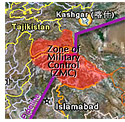 Back in 2006, the folks over at neweurasia asked me to write up a possible political/military scenario for Xinjiang in 2021. Ever since then, there has been a steady erosion in the perceived — and perhaps actual — stability of the region. What seemed like wild speculation at the time doesn't seem quite so outrageous now.
Back in 2006, the folks over at neweurasia asked me to write up a possible political/military scenario for Xinjiang in 2021. Ever since then, there has been a steady erosion in the perceived — and perhaps actual — stability of the region. What seemed like wild speculation at the time doesn't seem quite so outrageous now.
Take this excerpt from my original post, for instance:
"Beijing ignored initial protests in Hotan during the spring of 2018, only to send in troops that summer when evidence surfaced that Islamic extremists from Pakistan were actively infiltrating the Uyghur population and fomenting unrest."
Well, it looks like I was about 10 years late on the "initial protests in Hotan" part. But who knows what's gonna happen this summer? Will terrorists training in Pakistan make trouble across the border in Xinjiang? As it just so happens, China started rumbling about that very problem today:
In what is being described as the first instance when China has talked about difficulties in its relations with Pakistan, its ambassador in Islamabad said that Turkestan Islamic Movement, a militant separatist group in its Xinjiang province, which had links with al Qaeda, was operating from areas in Pakistan.
"The Turkestan Islamic Movement ... is really sometimes active, very active from your areas, certain provinces, such forces we never say are happy about our brotherly relations," the Dawn quoted Chinese Ambassador Luo Zhaohui as saying at a press briefing here.
Hotan protests... check. Terrorist turning towards China from Pakistan... check. Not that the specter of an East Turkestan threat from inside Pakistan is something new. But still, the ambassador brought it up for some reason... and I for one will be keeping an eye on China's posture towards Pakistan's new government.
Although I would derive some small amount of personal satisfaction from seeing my predictions become reality, I hope things don't keep moving in that direction.
China publicly voices concern over terror outfits operating from Pak areas
19 April 2008
Asian News International
© Copyright 2008. HT Media Limited. All rights reserved.
Report from Asian News International brought to you by HT Syndication.
Islamabad, April 19 -- In what is being described as the first instance when China has talked about difficulties in its relations with Pakistan, its ambassador in Islamabad said that Turkestan Islamic Movement, a militant separatist group in its Xinjiang province, which had links with al Qaeda, was operating from areas in Pakistan.
"The Turkestan Islamic Movement ... is really sometimes active, very active from your areas, certain provinces, such forces we never say are happy about our brotherly relations," the Dawn quoted Chinese Ambassador Luo Zhaohui as saying at a press briefing here.
He said China wanted Pakistan to be aware of these disruptive elements.
China characterises the Turkestan Islamic Movement as a terrorist group and suspects that it has links with Al Qaeda that has been providing "training and funding" to the militant movement.
The ambassador said that the Chinese government realised that the people and the government of Pakistan were friends of China, but there were certain forces working inside Pakistan which could damage bilateral relations.
However, he said he was optimistic that the two countries would be able to overcome these forces. "No one can damage our bilateral relations, cooperation and traditional friendship. It is an all-weather friendship," he added.
posted April 20, 2008 at 01:17 AM unofficial Xinjiang time | Comments (93)
April 18, 2008
Passover in Beijing?
 One of the main reasons I moved to Beijing was to be a part of the vibrant expat community here. So, I know there's gotta be at least one nice Seder this weekend for a secular Jew looking to taste a bit of matzo, some brisket, and maybe sing a song or two about that evil Pharaoh guy. Any tips? I saw that Chabad is hosting an event, but I'm afraid that it may be a little too hardcore for my reformed synagogue sensibilities. Chag Sameach!
One of the main reasons I moved to Beijing was to be a part of the vibrant expat community here. So, I know there's gotta be at least one nice Seder this weekend for a secular Jew looking to taste a bit of matzo, some brisket, and maybe sing a song or two about that evil Pharaoh guy. Any tips? I saw that Chabad is hosting an event, but I'm afraid that it may be a little too hardcore for my reformed synagogue sensibilities. Chag Sameach!
posted April 18, 2008 at 07:48 AM unofficial Xinjiang time | Comments (87)
April 16, 2008
New Delhi Torch Threat
 The Hindustan Times, citing Indian intelligence information, is warning of plans for an attack by Uyghurs on the Olympic torch relay tomorrow in New Delhi:
The Hindustan Times, citing Indian intelligence information, is warning of plans for an attack by Uyghurs on the Olympic torch relay tomorrow in New Delhi:
A SPECIFIC input from the Intelligence Bureau on attempts to disrupt the Olympic Torch Relay to be held in Delhi on April 17 has sent security agencies into high alert mode. The input has stated five Chinese nationals from Xinjiang region of China are in Delhi and pose a threat to the relay.
What makes the input important is that it has pinpointed information about the five men - their names, where they are staying in Delhi and the mobile numbers of a friend of theirs. The IB has even provided their photographs.
According to the input, a copy of which is with the Hindustan Times, the five "Uyghurs" from Xinjiang province - Mohammad Abdullah, Abdul Khalid, Umar Aziz, Yousaf Sattar and Abdullah Daoud - had entered India from Nepal. The five are also suspected to be involved in the East Turkestan movement.
Wow... they've even got names. Of course, India is also home to the Dalai Lama's government-in-exile, so the possibilities for a disruption tomorrow are really endless. Maybe we'll finally get to see evidence of that Tibetan-Uyghur conspiracy we've been hearing so much about?
That's not to mention today's journey through Islamabad where security is, umm, less than guaranteed.
Intelligence Bureau warns of Chinese militant attack
15 April 2008
Hindustan Times
by Tushar Srivastava
NEW DELHI, India, April 15 -- A SPECIFIC input from the Intelligence Bureau on attempts to disrupt the Olympic Torch Relay to be held in Delhi on April 17 has sent security agencies into high alert mode. The input has stated five Chinese nationals from Xinjiang region of China are in Delhi and pose a threat to the relay.
What makes the input important is that it has pinpointed information about the five men - their names, where they are staying in Delhi and the mobile numbers of a friend of theirs. The IB has even provided their photographs.
According to the input, a copy of which is with the Hindustan Times, the five "Uyghurs" from Xinjiang province - Mohammad Abdullah, Abdul Khalid, Umar Aziz, Yousaf Sattar and Abdullah Daoud - had entered India from Nepal. The five are also suspected to be involved in the East Turkestan movement.
The East Turkestan Islamic Movement (ETIM) is a militant Uyghur group that has been advocating the creation of an independent Islamic state of East Turkestan in the Xinjiang region.
"Daoud was recently in Kathmandu. The five are staying in Nizamuddin and a friend of theirs, Mohammed Tariq, is residing in New Seelampur," the input states. It also provides Tariq's mobile numbers and his address. "Tariq runs a business of fancy lights imported from China," it says.
"In view of the forthcoming Olympic Torch Relay, immediate action needs to be taken to apprehend the five and to examine the validity of their travel documents and other activities," the input reads.
The United Nations, US and China, among other countries, consider the ETIM a terrorist organisation. In a 2005 report, the US State Department reportedly said the group was linked to Al-Qaeda and the international jihaddist movement. Its members have been accused of several car bomb attacks in Xinjiang in the 1990s as well as the death of a Chinese diplomat in Kyrgyzstan in 2002.
The Hindustan Times is provided through HT Syndication, New Delhi.
posted April 16, 2008 at 09:48 AM unofficial Xinjiang time | Comments (36)
April 15, 2008
Faces of Death?

Click over to The New Dominion for information about a video possibly showing the execution of three Chinese hostages by Uyghur terrorists... emphasis on the word possibly.
posted April 15, 2008 at 01:10 AM unofficial Xinjiang time | Comments (39)
April 14, 2008
Very Hip, Very 798.
I guess I can't ignore my new life in Beijing forever on this blog. I'll have to post something every once in a while if I'm gonna keep my friends and family happy.
The good news is that the two weeks I've spent so far in Beijing have been awesome. Really. The air has been clean, the cherry blossoms are blooming, and I've been checking out fantastic restaurants, live music, scenic watering holes, and even was invited to an honest-to-god barbecue. I'm also meeting lots of very interesting people.
One thing I hadn't done in all my visits to Beijing over the years — until yesterday — was to check out Beijing's much talked-about art scene, with its nexus in the 798 art district up towards the airport. I took a few photos while strolling around this über-hip post-industrial gallery paradise and thought I'd share them with you below:
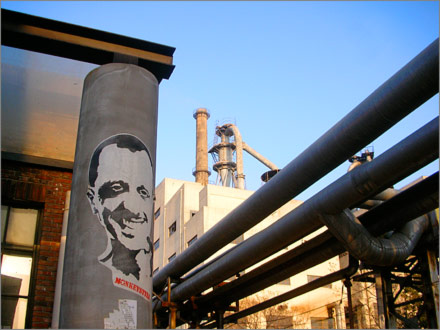
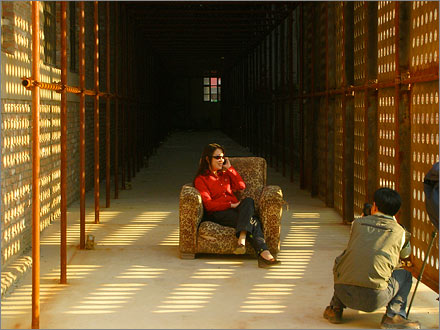
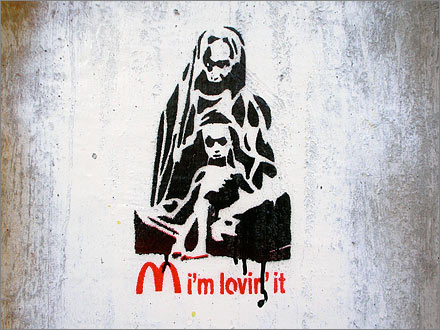
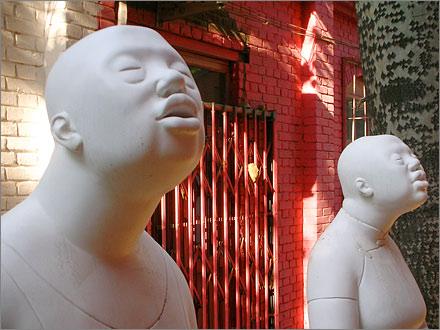
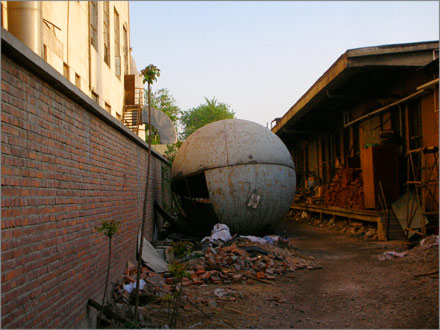
I fear that posting photos of 798 will label me a newbie amongst the elite Beijing blog corps, but to hell with it! I am a newbie, and after three years in Xinjiang I'm enjoying the capital like a kid in a candy store.
Now if I could only find a way to pay for my lavish new big-city lifestyle...
posted April 14, 2008 at 08:42 PM unofficial Xinjiang time | Comments (43)
April 13, 2008
New Old News
The breaking old news just keeps on coming...
From Xinhua via Reuters, a report that nine Buddhist monks have been arrested under suspicion of bombing a government building in Tibet on March 23. What!?! Are they saying that some Dalai cliquelings unleashed an evil feudal-powered attack nearly three weeks ago, and we're just hearing about it now?
Also, in the same article, a rumor that Tibetans are in league with al-Qaeda through connections to ETIM terrorists up in Xinjiang. (Sigh.)
Things keep getting weirder and weirder... and weirder.
posted April 13, 2008 at 12:02 AM unofficial Xinjiang time | Comments (43)
April 12, 2008
This is a test.
 From Xinhua —
From Xinhua —
One terrorist in the disguise of a patient detonated an explosive device in the outpatient hall of the Friendship Hospital at 5 p.m., killing three or four people instantly and injuring more than 30.
The blast also set a few facilities on fire and caused poisonous gas to spread to the wards, threatening the health of the in-patients.
The Urumqi government instantly launched a public health emergency plan, blocking adjacent areas of the hospital and summoning medical experts from other hospitals to the site.
Within five minutes, an emergency headquarter was set up and nine ambulances with more than 200 rescuers arrived at the Friendship Hospital.
After one hour, the explosion site was in order with injured people sent to other hospitals and experts investigating the attack.
••••
Oh, sorry... I forgot to mention that this was only the scenario for a "medical training exercise" held yesterday. Hope I didn't scare anyone! Coming just one day after Chinese authorities unmasked an audacious East Turkestan terrorist plot to annihilate the Olympics, maybe it would have been wise to delay this particular simulation (or at least the Xinhua story) for a few days?
China's Xinjiang holds medical simulation exercise on terrorist bombing
11 April 2008
Xinhua News Agency
URUMQI, April 11 (Xinhua) -- China's Xinjiang Uygur Autonomous Region on Friday held a medical training exercise in the wake of a simulated terrorist bombing, one day after the Ministry of Public Security announced the breakup of two terrorist groups in the northwestern area.
The exercise, under the direction of the health bureau of Urumqi, Xinjiang's regional capital, focused on an emergency response by medical institutions and authorities.
According to the exercise scenario, one terrorist in the disguise of a patient detonated an explosive device in the outpatient hall of the Friendship Hospital at 5 p.m., killing three or four people instantly and injuring more than 30.
The blast also set a few facilities on fire and caused poisonous gas to spread to the wards, threatening the health of the in-patients.
The Urumqi government instantly launched a public health emergency plan, blocking adjacent areas of the hospital and summoning medical experts from other hospitals to the site.
Within five minutes, an emergency headquarter was set up and nine ambulances with more than 200 rescuers arrived at the Friendship Hospital.
After one hour, the explosion site was in order with injured people sent to other hospitals and experts investigating the attack.
The exercise, the first of its kind in the city, was "successful" and provided experiences for possible attacks, said Vice Mayor Tong Zhaoling.
On Thursday, the Ministry of Public Security said they had smashed two terrorist groups who had planned to start terrorist attacks using explosives and poison in Beijing and Shanghai to wreck the Olympic Games and to kidnap foreign journalists, tourists and athletes during the Games.
posted April 12, 2008 at 02:59 AM unofficial Xinjiang time | Comments (33)
April 09, 2008
Round Up the Usual Suspects!

UPDATE China has announced the break-up of another old-new Uyghur terror plot in Xinjiang. Apparently, foreigners in Beijing for the Olympics were going to be kidnapped and/or attacked with explosives and poison.
••••
From Gordon Fairclough of The Wall Street Journal comes news of a massive, pre-emptive roundup of Uyghur ne'er-do-wells in... umm, Henan?
Chinese paramilitary police sealed off a market town in central China last month and detained dozens of ethnic Uighurs, said local residents and a government official.
The arrests, which occurred in late March in Henan province but weren't reported at the time, appear to be part of an expanding Chinese government effort to prevent dissatisfaction among Turkic Uighurs from exploding into the kind of unrest that has swept Tibetan areas of the country.
Witnesses said hundreds of armed police descended on the Henan town of Shifosi, where there is a significant population of Uighur jade traders. "About 50 Uighurs were arrested," said a local government official.
I'll tell you one thing... the Chinese government is doing a damn good job keeping the lid on events like this, at least while the situation is still hot.
There's quite a bit of impact taken out of news when it arrives a few weeks late, don't ya think? Between unreported news, factually incorrect statements, and untimely disclosure you never know what's happening — especially not when it happens. And that's the point.
posted April 09, 2008 at 02:21 PM unofficial Xinjiang time | Comments (36)
April 08, 2008
What Happened in Urumqi?
 With Tibet still mostly off-limits to journalists, it seems like everyone and their mamma has been having a go at Xinjiang. Which is good, but... well, we feel a little bit like a backup date for the prom.
With Tibet still mostly off-limits to journalists, it seems like everyone and their mamma has been having a go at Xinjiang. Which is good, but... well, we feel a little bit like a backup date for the prom.
Just when questions about the alleged January 27 raid on a terrorist cell in Urumqi were fading into oblivion, AFP has stirred things up with some solid on-the-ground reporting:
Weapons, explosives and militant Islamic literature were allegedly seized in the raid, which made world headlines for its implications on Olympic security.
Strangely, however, it went largely unnoticed at Happiness Garden, whose flats are so tightly packed it would be difficult to keep anything from the neighbours.
The Uighur resident said he watched a van pull up, from which several men in plain clothes emerged, later escorting two people from the building and into the van.
There was no gunfire or explosions, he said.
His account was backed by at least one other resident, an ethnic Han Chinese woman. More than a dozen neighbours who were eager to discuss the case said they heard and saw nothing.
"It's very quiet here. Everybody would have heard something like that," said the Chinese woman.
Hmmmm. For anyone who's lived in a typical Chinese apartment block, you can probably imagine that grenades being thrown somewhere in the neighborhood wouldn't go unnoticed. Hell, you can hear people setting off firecrackers for miles around during Spring Festival, the blasts bouncing off the walls through China's endless concrete jungle.
The question now is whether or not there will be a response to the allegation implicit in the article that someone isn't being 100% truthful about the Happiness Garden incident. (And what about that equally odd attempt to bring down an airliner with gasoline?)
On the bright side for the Chinese government, at least one resident expressed his supreme faith in the state:
"They captured a whole bunch of terrorists and there was a big fight," declared a Chinese man in his 50s who lives adjacent to the raid site, although he soon admitted learning of the raid only later from state media reports.
"The government said so. They would not lie," he said.
Someone, please pin a flag on that fine gentleman.
Months later, Xinjiang 'terror' raid remains a mystery
URUMQI, China (AFP) — Mystery continues to surround official reports of a deadly raid in Urumqi that saved the Beijing Olympics from a terrorist attack.
As China tells it, police burst into the Happiness Garden apartments in this northwestern city and raided a fourth-floor flat where "terrorists" were holed up.
But that's news to residents of the quiet middle-class compound in the dusty and remote Xinjiang region.
"No, no, no. There was nothing like that. That's nonsense," said a local resident, a member of the Muslim ethnic Uighur minority, when asked about the dramatic official version of the January 27 raid.
The man, whose name has been withheld to protect him from possible reprisals, was one of more than a dozen residents to question Chinese reports that Beijing said proved a terror threat in vast, heavily Muslim Xinjiang.
In an ensuing clash described by state-controlled press and Xinjiang's top Communist Party official, Wang Lequan, militants threw grenades at police, injuring seven officers.
Eventually, two militants were killed and another 15 captured by police.
Weapons, explosives and militant Islamic literature were allegedly seized in the raid, which made world headlines for its implications on Olympic security.
Strangely, however, it went largely unnoticed at Happiness Garden, whose flats are so tightly packed it would be difficult to keep anything from the neighbours.
The Uighur resident said he watched a van pull up, from which several men in plain clothes emerged, later escorting two people from the building and into the van.
There was no gunfire or explosions, he said.
His account was backed by at least one other resident, an ethnic Han Chinese woman. More than a dozen neighbours who were eager to discuss the case said they heard and saw nothing.
"It's very quiet here. Everybody would have heard something like that," said the Chinese woman.
AFP contacted the police station that has jurisdiction over Happiness Garden, as well as the regional police headquarters and the Public Security Ministry in Beijing for more information about the raid.
None gave any comment.
China has released only bare details of the raid -- and of separate allegations of a failed attempt by a Uighur woman to blow up a Chinese airliner flying from Urumqi to Beijing on March 7.
Exiled Uighur leader Rebiya Kadeer last month called both plots fabrications.
"The real goal of the Chinese government is to organise a terrorist attack so that it can increase its crackdown on the Uighur people," said Kadeer, 61, the head of the Uyghur American Association, now in the United States after serving a Chinese jail term.
Xinjiang's roughly 8 million Uighurs, a central Asian, Turkic-speaking people, have long bridled under nearly six decades of Chinese rule.
Nicolas Bequelin, a China researcher with Human Rights Watch, said he doubted Xinjiang authorities would completely fabricate a terror cell, but added there was pressure from Beijing for local results on terrorism with the August Olympics approaching.
"Certainly the government is keen to emphasise the terror risk in Xinjiang and paint everything with the same brush. Criminal activity is often crudely conflated with terrorism," he told AFP.
"China has muddied the waters on this so much that it is impossible to know the truth."
Real or not, the plots have led to tightening police control, Urumqi residents told AFP.
"It is very tense. There is more police activity, more people being taken away," said Jelil Aziz, a businessman who said his own brother was held by police for several days last month.
China's policy of encouraging Han Chinese migration to the region has caused an economic boom but also Uighur complaints of a creeping elimination of their culture and discrimination in business and education.
If nothing else, the alleged terror raid has highlighted these divisions.
Most ethnic Chinese questioned by AFP believed government accounts, while Uighurs were skeptical, contradicting China's claims that its many ethnic groups live in harmony.
"They captured a whole bunch of terrorists and there was a big fight," declared a Chinese man in his 50s who lives adjacent to the raid site, although he soon admitted learning of the raid only later from state media reports.
"The government said so. They would not lie," he said.
A local Uighur resident, one of many who noted the difficulty of hiding 17 terrorists in Happiness Gardens' tiny flats, took a different view.
"It's what the government says, but does that make it true?" asked the woman, whose name was withheld by AFP.
"There is no way to know for sure."
posted April 08, 2008 at 03:33 PM unofficial Xinjiang time | Comments (57)
April 06, 2008
Moses Is Dead.

posted April 06, 2008 at 04:03 PM unofficial Xinjiang time | Comments (37)
April 05, 2008
The Phantom Bus Bombing
UPDATE The New York Times has removed the quote I criticized below from the online version of the Howard W. French article. The paragraph covering the Urumqi bomb rumor now stops at the official Chinese denial.
••••
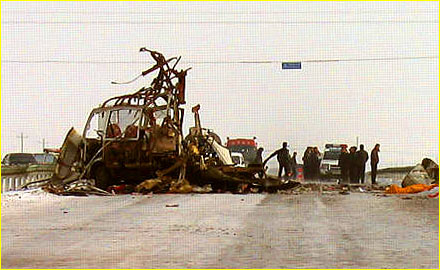
Remember the rumor of a bus bombing last month in Urumqi that was quickly dismissed as a hoax by government officials? Well, Howard W. French has found an anonymous American who fancies himself an eye-witness to a cover-up:
On March 18, a rumor spread quickly through the streets of Urumqi that an Uighur woman had detonated a bomb on a city bus, escaping before its explosion. Officials have denied that account, but in a telephone interview an American resident of Xinjiang’s bustling capital said that he had visited the scene hours after the rumor spread and found what looked like a heavily guarded impromptu construction site, where workers refused to talk and urged him to leave.
“Pretty much everyone you speak to, whether Chinese or Uighur, says a bomb went off,” said the American, who declined to be identified by name. “That same night there were riot police in full gear patrolling the neighborhood, and since then I’ve seen heavy police patrols everywhere, including riot police at the main markets, with tear gas, automatic weapons and armored personnel carriers with gun turrets parked nearby.”
“We’ve been here for three months and it was certainly never been like this before.”
Is it just me or does the use of this quote smack of sensationalism? Almost everyone I've talked to in Urumqi accepts that the bus bombing was only a rumor. Yet Howie French manages somehow to find one unnamed nutcase, quote him heavily, and... voila! His case that unrest is "spreading" from Tibet to Xinjiang is made. (What does Urumqi have to do with Garze, anyway?)
The ease with which French moves from Tibet to Xinjiang and conflates the two situations— supported almost completely by rumor and hearsay — runs the risk of leaving his readers misinformed and confused*. I'm no supporter of the recently popular anti-CNN crowd, but articles that fan the flames of ethnic tension to combine unrelated incidents into one easily digestible news package seem irresponsible, no?
Even so, I'll put the question out there for my Xinjiang-based readers: Does anyone have anything new to report on the bus bombing story?
* Sort of like using a three-year old photo of a bus bombing with this post. What, were you mislead?
posted April 05, 2008 at 01:41 AM unofficial Xinjiang time | Comments (71)
April 03, 2008
Hotan
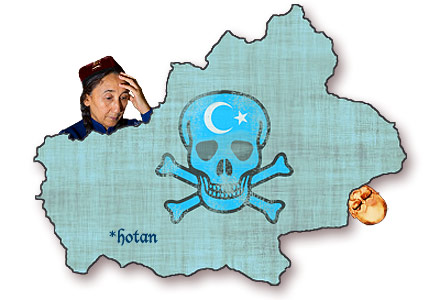
Many of you will have heard by now that the Chinese government is confirming Uyghur protests in Hotan last week. (Rumors started appearing on this site a few days ago.)
The reason for the protests? Well, it seems to have something to do with a ban on headscarves or the death of a prominent Uyghur businessman in police custody. Either way, it's not really related at all to the Tibetan situation or the Olympics in any way. (Q: Is Xinjiang the next Tibet? A: Is Afghanistan the next Bhutan?) If this protest had taken place before March 14th, no one would be paying attention at all and no one would care.
But with the whole world waiting for western China to explode, people seem to be seizing on the Xinjiang unrest as some sort of spreading of the flames of unrest. That's a bit of a reach, if you ask me.
Of course, with Rebiya Kadeer writing an editorial in the Washington Post today declaring Uyghur solidarity with the Tibetan people, I'm sure we're just hours away from an endless stream of Xinhua diatribes against the Dalai-Rebiya clique.
Anyway, I'm considering this case closed, as its a week old and I don't see the potential for any further "spreading" of unrest in Xinjiang. But that's no guarantee that some new problem might not arise.
More analysis over at The New Dominion.
posted April 03, 2008 at 12:48 AM unofficial Xinjiang time | Comments (180)
April 01, 2008
Qomolangma & the Secret Flame
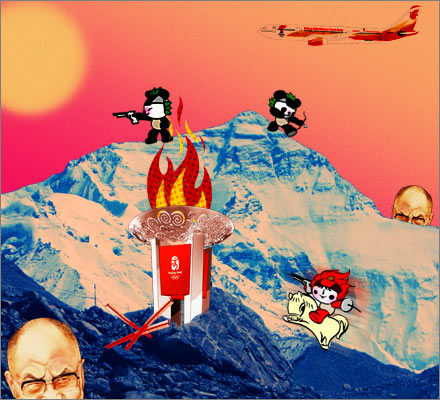
I was reading about the Olympic torch ceremony held here in Beijing yesterday when a bit of information caught my eye:
One [torch] will be flown Tuesday to Almaty, Kazakhstan, to begin an international relay covering five continents and including a stop in San Francisco.The other torch is being flown to Lhasa and then being transferred to a base camp below Mount Everest. There, the flame is expected to be stored in a special lantern until May, when a team of climbers — and two specially trained camera operators for Chinese state television — will try to carry the burning torch to the summit of the world’s highest mountain and back down.
Now, like most of you I'd heard about China's plans to bring the Olympic flame to the highest point in the world — known as Mt. Everest in the West and Qomolangma here in China — but this is the first time I'd heard any of the details. In fact, after searching far and wide for more info on the flame's Himalayan ascent it became clear to me that Beijing is keeping things very hush-hush. For instance, take a look at these BOCOG maps of the flame's journey:
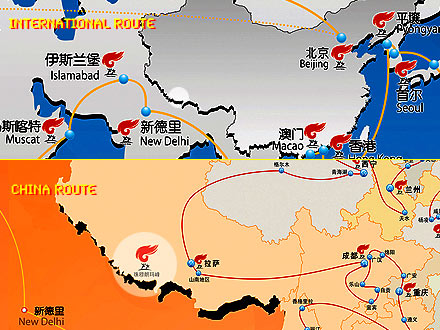
As you can see, neither of the routes leads to Everest. So, it started me thinking... unrest in Tibet, a tiny flame carrying the hopes of all China stored at secret base camp high in the mountains, tight security, and government secrecy. Hrmm. Throw in a glass of holy water from some glacial Tibetan lake, Bruce Willis, and a bad-ass monk or two trying to extinguish the flame and you've got an awesome action movie plot.
In more serious news, I read a translation yesterday of an interesting Xinhua editorial in which the basic framework of Chinese thought towards the situation in Tibet is laid out quite simply, making it clear that both sides are talking past each other and no agreement will ever be possible:
In today's Lhasa, there are high-rise buildings of Tibet characteristics everywhere; broad roads lead to various areas; public facilities are complete; the environment is beautiful; man and nature coexist in peace and harmony; the masses' material and cultural life is very rich. All these manifest the glamour of the highland city to the people of the world. The people of Lhasa are enjoying the great achievements brought by reforms and opening up to the outside world.
After the implementation of the projects to transform the old city region and to lower house rents, the people of Lhasa are living in comfortable and practical new houses and are able to watch excellent television programmes and listen to Tibetan language radio broadcasts. The houses of ordinary people generally have modern household equipment, such as refrigerators and colour television sets, and communication tools, such as cell phones. Many families have bought private cars.
Argh! The Chinese government just doesn't get it. Do they seriously think that Tibetans want to trade their proud cultural and religious heritage for a shiny new TV?
The article goes on to list examples of the how the Dalai Lama consistently makes trouble in an otherwise problem-free region:
Let's take a look at history, between 1987 and 1989 following the restoration of the Grand Summons Ceremony in Lhasa to confer degrees to monks, the Dalai clique engineered and incited disturbances in Lhasa many times. As a result, monks in various monasteries were unable to recite scriptures; normal social order was not guaranteed; and the grand prayer meeting that is held once a year at the Jokhang Monastery had to be suspended.
When Tibet established nature reserves, strengthened environmental construction, its ecological environment continued to improve, and especially when Tibet built the environment-oriented Qinghai-Tibet Railway, which brings benefit to the people of nationalities in Tibet, while developing its economy, the Dalai clique dished out such views as "Tibet's environment is being destroyed" in an attempt to hinder Tibet's economic development.
When Tibet's outstanding traditional culture is protected, and the demand to inherit and carry forward the spiritual culture of the masses of people is being constantly satisfied, the Dalai clique says "Tibet's traditional culture is being destroyed" in an attempt to forever maintain the "traditional culture" of their desire in order to place the masses of people in a state of being enslaved and hoodwinked. There are too many examples to cite.
You can read the editorial — translated by the good folks over at the BBC Monitoring Service — in its entirety below.
UPDATE/QUOTE OF THE DAY
"To our knowledge, the next plan of the Tibetan independence forces is to organize suicide squads to launch violent attacks."
Wu Heping, Public Security Bureau spokesman (link)
••••
Dalai Lama "clique" accused of trying to "undermine Tibet" stability - Xinhua
31 March 2008
BBC Monitoring Asia Pacific
Text of report by official Chinese news agency Xinhua (New China News Agency) Asia-Pacific service
[Report by reporters Gama Duoji, Bai Bing, and Ye Hui: "The Tree Craves Calm, But the Wind Will Not Subside - the Dalai Clique Interferes With and Undermines Tibet's Development and Stability"]
Lhasa, 30 Mar (Xinhua) - Cuomu, who had operated a shop selling tourist products for more than 10 years in Bakuo Street -the oldest business street in Lhasa, went through the entire process of the occurrence of the "14 March" violent incident of beating, smashing, looting, and burning in Lhasa. "I was also beaten and lost many products. At that time, I was so frightened that I ran desperately towards home. I didn't even know I had lost some clothes while still running." When she talked about the incident of half a month ago, she was still trembling with fear.
"The incident has produced too much an impact on us. We dare not go out to do our business, and there is no guarantee we can lead a normal life. I am extremely worried," said Cuomu. "In the days to come, are tourists inside and outside the country willing to come to Tibet for sightseeing? Can I continue to do my business?"
"The '14 March' violent incident of beating, smashing, looting, and burning in Lhasa has undermined Tibet's excellent and hard-to-get situation. I really don't understand," said Living Buddha Xinza Danzengquzha, vice chairman of the Tibet Autonomous Regional People's Congress Standing Committee.
Since the 80's of the last century, the central authorities have put into effect a series of policies and measures to support Tibet and mobilized the strength of all walks of life in the country to assist Tibet. In recent years, Tibet's economy and society have developed by leaps and bounds. The people's standard of living has clearly improved; social stability has been strengthened with each passing day; and marked achievements have been scored in construction in agricultural and pastoral regions. The opening of the Qinghai-Tibet Railway has further strengthened the ties between Tibet and the hinterland and pushed forward the development of tourism.
In today's Lhasa, there are high-rise buildings of Tibet characteristics everywhere; broad roads lead to various areas; public facilities are complete; the environment is beautiful; man and nature coexist in peace and harmony; the masses' material and cultural life is very rich. All these manifest the glamour of the highland city to the people of the world. The people of Lhasa are enjoying the great achievements brought by reforms and opening up to the outside world.
After the implementation of the projects to transform the old city region and to lower house rents, the people of Lhasa are living in comfortable and practical new houses and are able to watch excellent television programmes and listen to Tibetan language radio broadcasts. The houses of ordinary people generally have modern household equipment, such as refrigerators and colour television sets, and communication tools, such as cell phones. Many families have bought private cars.
"The violent incident of beating, smashing, looting, and burning this time has once again proved that every time Tibet has made a new stride forward in developing the economy and society and in improving the people's standard of living, the Dalai clique will resort to all means and spare no effort to undermine Tibet," said Living Buddha Xinza Danzengquzha.
Let's take a look at history, between 1987 and 1989 following the restoration of the Grand Summons Ceremony in Lhasa to confer degrees to monks, the Dalai clique engineered and incited disturbances in Lhasa many times. As a result, monks in various monasteries were unable to recite scriptures; normal social order was not guaranteed; and the grand prayer meeting that is held once a year at the Jokhang Monastery had to be suspended.
When Tibet established nature reserves, strengthened environmental construction, its ecological environment continued to improve, and especially when Tibet built the environment-oriented Qinghai-Tibet Railway, which brings benefit to the people of nationalities in Tibet, while developing its economy, the Dalai clique dished out such views as "Tibet's environment is being destroyed" in an attempt to hinder Tibet's economic development.
When Tibet's outstanding traditional culture is protected, and the demand to inherit and carry forward the spiritual culture of the masses of people is being constantly satisfied, the Dalai clique says "Tibet's traditional culture is being destroyed" in an attempt to forever maintain the "traditional culture" of their desire in order to place the masses of people in a state of being enslaved and hoodwinked. There are too many examples to cite.
At the end of the 50's and the beginning of the 60's of the last century, Tibet's social system underwent a historic change and a leap forward. Under the People's Congress system and the system of regional autonomy in areas inhabited by minority nationalities, the people of Tibet are masters of their own country and have opened up a historic new era of building socialism. With the concern of the central government and the self-less assistance of the people of the whole country, the people of Tibet have scored marked achievements in socialist modernization construction after going through scores of years of hard work. In 2007, Tibet's GDP amounted to 34.219 billion yuan, and its per capita GDP was 12,000 yuan.
In the new period, the central government has introduced the "live in peace" project in Tibet. As of now, 114,000 farming households have moved into new houses. In coordination, the Tibet Autonomous Region has solved the problem of road connections for 219 towns and townships and for 1,490 administrative villages; the problem of safe drinking water for 1.02 million farmers and herdsmen; the problem of postal connections for 111 central towns and townships; the problem of telephone connections for 3,712 administrative villages; and solved and improved the problem of electricity for 650,000 farmers and herdsmen.
In the past five years, the Tibet Autonomous Region has invested 8.22 billion yuan in building 437 town and township regular elementary schools and in expanding and rebuilding 93 junior middle schools and five vocational schools. Subsidies for "three assured" students have been increased by a big margin. School and miscellaneous fees and book fees for urban students in the period of compulsory education have been exempted. Compulsory education has covered both urban and rural areas in the true sense. The medical care system for farming and pastoral areas, which is based on free medical care, now benefits all farmers and herdsmen. The health and medical cadre system, the disease prevention and control system, and the medical care and rescue system for unexpected public health incidents, which cover both urban and rural areas, are being gradually improved.
A Tibetan saying says: "A wise man does the right thing because he knows the reason; a foolish man does the wrong thing because he does not know the reason." In the past 30 years since the start of reforms and opening up to the outside world, infrastructure facilities and the people's standard of living in Tibet have developed rapidly. The stable social environment of the past many years in Tibet has enabled its economy to grow at a speed of more than 12 per cent annually in the past seven years successively. Facts have proved that without stability, there would not have been today's leap-forward development in Tibet.
Yixi Luozhui, a resident in Lhasa, said: "After seeing those burned out resident buildings, the innocent people receiving medical treatment in hospitals, and the armed police officers and soldiers who were wounded trying to protect us, we found it difficult to suppress our indignation. The plot of a small number of unlawful elements to undermine Tibet's harmony and stability runs counter to the desire of the people of all nationalities in Tibet."
Source: Xinhua news agency, Beijing, in Chinese 0741 gmt 30 Mar 08
posted April 01, 2008 at 10:09 AM unofficial Xinjiang time | Comments (137)
